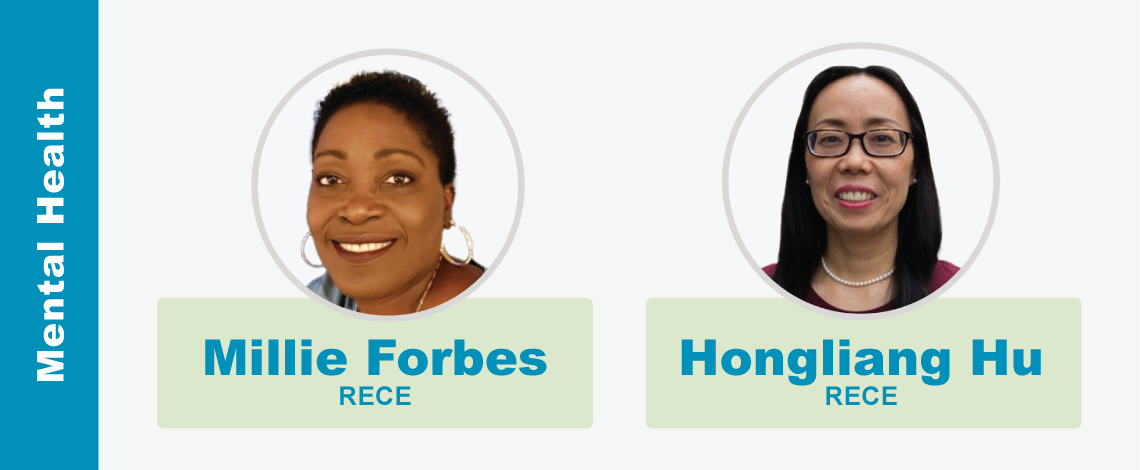At the core of the early childhood education (ECE) profession are incredible people who often focus on the needs of others before themselves, which can result in fatigue and burnout. When early childhood educators (ECEs) prioritize mental health and well-being, it benefits everyone, especially the children they care for.
The journey to take care of your well-being looks different for each one of us. There’s no “one size fits all” approach. We all have lived experiences influenced by different environments, making our mental health needs unique. However, we can all learn from each other’s experiences and practices when caring for ourselves and carving out a path that best supports our needs.
For inspiration to care for yourselves in and out of your work environment, we spoke with Millicent (Millie) Forbes RECE who recently retired after almost 40 years in the early learning profession, and Hongliang Hu RECE, who’s been an RECE for more than 15 years.
What do you do to take care of your mental well-being, within your work environment and away from it?
Hongliang Hu RECE
Within my work environment:
Self-care includes things I do to restore and increase my mental and emotional well-being. By finding ways to replenish my well-being during work, I can be a more productive and motivated employee. Each day:
- I pack a nutritious and delicious lunch and choose ingredients that are going to make me feel energized.
- I also add some purpose to my work day by setting personal and professional goals for myself.
- I’ll start feeling more motivated and inspired to make my day more meaningful within a supportive work environment.
- Being in nature, or even viewing scenes of nature is one of my best things daily. Nature gives us a sense that we are part of something greater than ourselves. It can get us out of our own heads.
Away from the work environment:
- I feel engaged in activities outside of work that bring joy and relaxation.
- Listening to music helps me feel calm, capture my attention, boost moods and create a sense of happiness and pleasure.
- I also incorporate mindfulness practices, meditation, or deep-breathing exercises into my daily routines to promote mental well-being.
- Hobbies and leisure activities contribute to a well-rounded and fulfilling life. In my free time, hiking the Bruce Trail is one of my favorites. Hiking with carrying a pack and using poles engages the whole body, increase strength, boost endurance and contribute to a healthy mind.
Millie Forbes RECE
I am recently retired from the practice of early learning. I was fortunate to work for an employer who supported mental health and well-being. Our health benefits included a wide range of services to take care of your physical and mental well-being. I took advantage of these services in and outside of the work environment. For example, we had benefits for psychotherapists. It’s good to talk to an expert about some of the challenges you face in life; you don’t have to go through them all by yourself.
At work, a good support system was nurtured and it proved to be effective for my team and me. Our team meetings included check-ins on how we are all doing, and there was a true sense of safety in doing so. Sometimes, there were days when I felt a little overwhelmed or anxious about something. I would pause, listen to my mind and my body, and commit to an action that helps me release that feeling. It can be a few deep breathing exercises or a few stretches.
Outside of work now in retirement, I spend time by the water. I’m lucky to live near Lake Ontario so I frequently take walks by the shore – it’s therapeutic. Having recently been diagnosed with an autoimmune condition, eating well and getting a good night’s sleep are essential.
Taking care of myself continues to be a work in progress for me. There were those days when it used to be that a chocolate bar and my couch was all I could handle at that moment, and that’s OK. Now I eat all kinds of berries and drink a lot of water to aid in my continued wellness. Try to make choices that keep you physically and mentally well.
For resources and support, visit our Wellness Resources page.
More about Millie and Hongliang:
Newly retired as of March 2024, Millie Forbes’ tenure of almost 40 years in the profession has seen her hold various roles. Millie began her career as a supply teacher for the Nursery Support Services. She later served as an educator, assistant director and director with the YMCA of Greater Toronto, and was a supervisor in the Regional Municipality of Durham’s Directly Operated Programs for 19 years. Most recently, she was a Quality and Contract Compliance Advisor with the Regional Municipality of Durham, Children’s Services Division. She also served in a lead role as a facilitator for Durham Region Children’s Service Anti-Black Racism initiatives, and as a committee member of Best Start Durham, supporting the Early Years community in Durham. Millie has always been a strong believer that early childhood educators are essential contributors to healthy societies.
Hongliang Hu holds both an MEd degree in Curriculum and Pedagogy and an MA degree in Early Childhood Studies (ECS). She has her Specialist qualification in Environmental Education. Her research and publication interests include early years curriculum, pedagogy, policy and practice; social research with children; nature-based education, environmental inquiry and climate change education in the early years. The combination of her academic achievement and professional experience, makes her stand out as a specialist in environmental education, contributing to the advancement of sustainable practices and environmental awareness in the early years and beyond.

